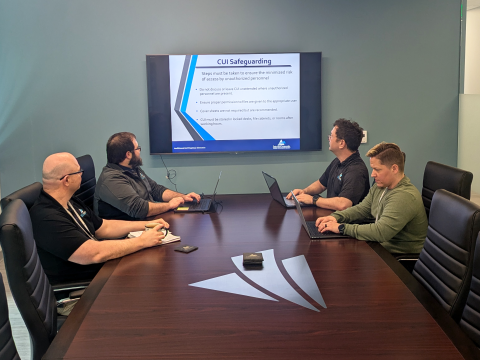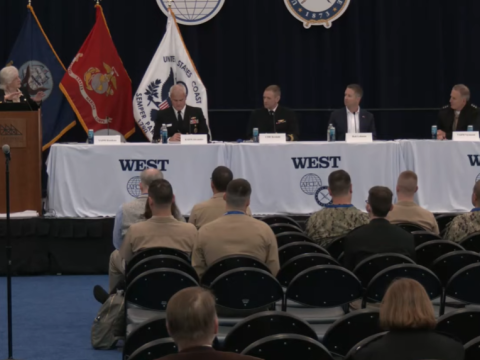An Industry Perspective on Closing the Cyber Workforce Gap
By now, it’s well known there is a cybersecurity workforce gap throughout all levels of government, academia and industry. The Center for Strategic and International Studies found in a survey of IT decisionmakers across eight countries that 82 percent of employers report a shortage of cybersecurity skills, and 71 percent believe this talent gap causes direct and measurable damage to their organizations.
By 2022, the global cybersecurity workforce shortage has been projected to reach upwards of 1.8 million unfilled positions, according to a Global Information Security Workforce Study by Frost & Sullivan in 2017.
Unfortunately, this is not a problem that is getting smaller, says Ryan Bagby, senior program manager, Cybersecurity Special Missions, Raytheon Intelligence, Information & Services. “That’s why we started the Raytheon Cyber Academy,” he says.
“We are not going to be able to hire ourselves out of this problem. We’re in a talent war with industry and government and academia, all trying to hire that limited resource,” Bagby adds.
He equates the talent war to a game of musical chairs. “We can’t go out and hire 100 people and then have 99 people hired away from us that are doing the same things,” says Bagby.
So, the model needs to change. Raytheon developed the academy with the intent to build operators that can do those cyber jobs from day one. Raytheon is a little different than some other training providers in the market right now because it is less focused on industry certifications, Bagby states.
“We still see the value and importance of them, but above that, we are placing a strong importance on somebody’s ability to do the job once they graduate our academy,” says Bagby.
The academy is a cloud-based, subscription service where Raytheon is providing the curriculum and the expert instructors, who have done the job before and are able to transfer that expertise to the classroom wherever customers are, in the U.S. and abroad.
Bagby, who spoke on an industry panel at the Cyber Education, Research and Training Symposium (CERTS) earlier this month in Augusta, Georgia, leads all development and execution aspects for Raytheon’s Cyber Training initiatives within the Cybersecurity and Special Missions sub-mission area. He believes one of the big benefits of working with a company like Raytheon is that it is delivering cyber at the nation’s scale right now.
“We’ve gained a lot of rich expertise, a lot of lessons learned; we know what the current environment is and our academy is not just a one-and-done type thing,” Bagby asserts. “We are constantly updating that curriculum to include current threats and tools so that learners have immediate access to things that are relevant in the cyber threat landscape today and not something that’s been developed and then forgotten about,” he adds.
Gamification is one of the things that Raytheon is incorporating now to reach operators and deliver training in the manner that they are most comfortable learning in. “We’re always evaluating ourselves through surveys at the end of a course, making sure we are finding the most efficient way to connect with learners,” says Bagby.
A lot of that is hands-on, practical exercise pieces. Instructors aren’t going to lecture for weeks on end. Sixty percent of the courses are hands-on labs or applied exercises where the students receive real-world expertise and are able to do the job in that safe, secure classroom environment, Bagby adds.
During his keynote at CERTS, Lt. Gen. Stephen Fogarty, USA, commanding general, U.S. Army Cyber Command, discussed imagining new and creative ways to solve the cyber workforce problem, including hiring cyber workers with a wide variety of backgrounds.
“Gen. Fogarty is exactly right,” says Bagby. “We are embracing that certainly.”
Raytheon is able to hire cyber operators effectively right out of high school, so they don’t need a four-year degree to start the program. “That’s really critical in how we start to make a dent in that talent gap we are seeing,” Bagby states.
The company also hopes to partner with the Defense Department and bring training to them. Bagby believes Raytheon can help identify gaps in the DOD’s training but also recognizes that there is not just one single solution to closing the talent gap.
“Not one of us is going to be able to solve this problem alone, so I think it’s the idea that a rising tide lifts all boats,” says Bagby. There must be collaboration with the government, military and academia to make sure every area of training need is being addressed. Ultimately, "we need to grow that base so that we’re not fighting for such a limited resource,” he says.
In addition to the academy, Raytheon also sponsors the National Collegiate Cyber Defense Challenge. "We see that as an avenue for us to build that next generation of cyber talent," Bagby explains. There's not always a degree requirement to participate, but it's important to get those people started in STEM programs and thinking about cyber jobs early on, he adds.
To learn more about Raytheon’s Cyber Academy and its National Collegiate Cyber Defense Challenge, visit www.raytheon.com/cyber.
For more on CERTS, visit www.afcea.org/site/certs20-archive.




Comments